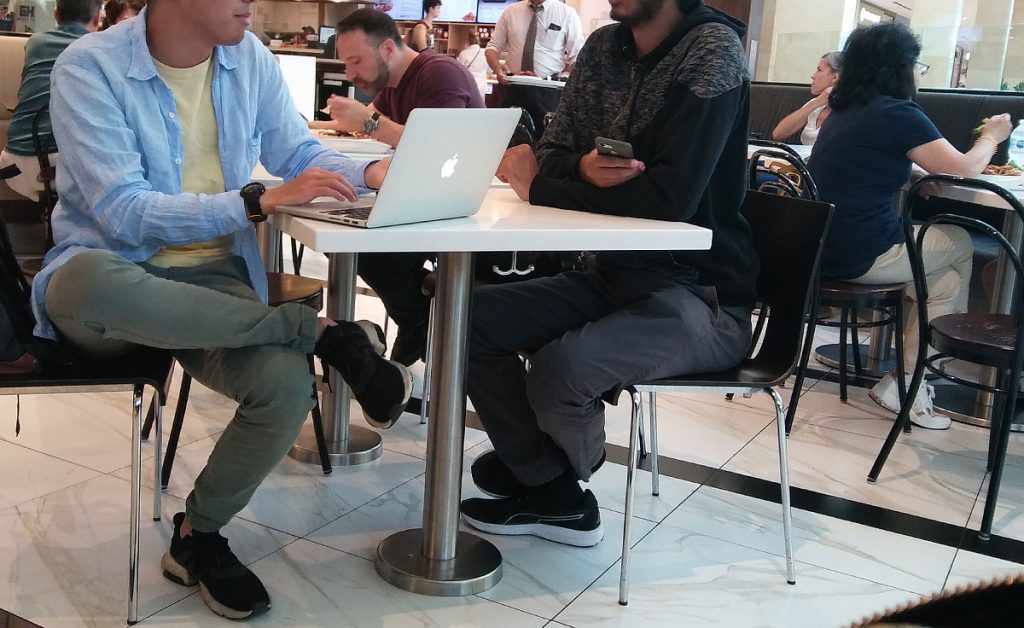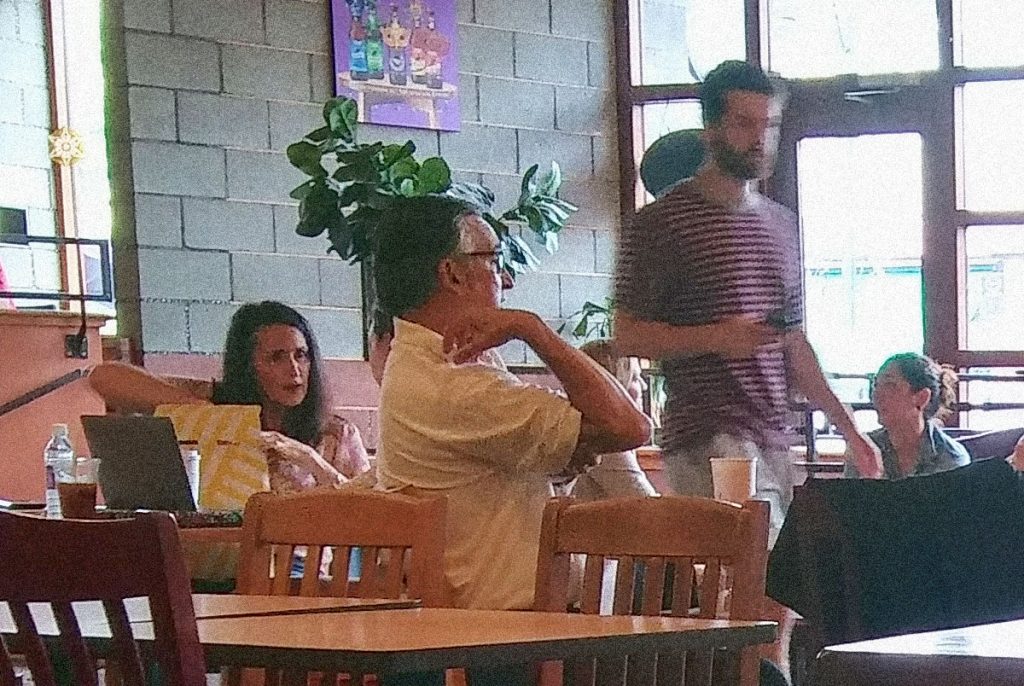Baby Boomers, Gen. X’ers, and the Traditional or Silent Generations live in a world of technological advances they have not grown up with. Many of these three groups of people have embraced many new things to keep up with the times.
Many are still trying to figure out how the world has changed so fast and how they will keep up with what; by now, everyone knows it will only change faster!

Many of us are not up to speed, but if you are a Millennial, you are very comfortable with technology. Advances in technology have made a lot of jobs more manageable. Perhaps this is one of the reasons Millennials are said to be the happiest workforce in history.
We are living for the first time in history when several generations are in the workplace at once.
We did not arrive in a vacuum. Each generation carries with it the lessons, successes, and failures of the ones preceding it. Also, unlike other generations, many of us fill multiple roles. Most of the grandparents of the Baby Boom generation, called the Lost Generation, are not with us any longer. Their influence is, however, very much felt and, in many ways, has colored how Baby Boomers have parented their children, which now influences the Millennial Generation.
Almost every way we conduct business and live our lives has come into use during the time Millennials were growing up. It is a very different world to grow up in than the generations preceding the Millennials.
Here are a few new technologies that have come about since Millennials were born.
- Internet Banking, ATM Deposits by Cell Phone
- Blockchain and BitCoin
- Debit Cards
- The Internet -www. Browser Html coding.
- Websites and Blogs
- Personal Computers and Computing, including laptops
- Cell Phones
- Youtube
- Digital Photography and Videography – with Media File Compression, i.e., jpeg, png, mpg, mp3.
- Digital TV – Watch when you want.
- The ability to talk back to the government via online resources
- Social Media
- Booking Travel Online
- Disruption of major industries and jobs.
- The creation of new industries and jobs.
- Robotic Surgery – ‘Laparoscopy’
- Outsourced Jobs and the rise of China
- Careers as Digital Nomads
- MRI-‘Magnetic Resonance Imaging’
- DNA -Testing, Sequencing, and Mapping the Human Genome
- Fundamental changes to business operations through new Office Software, Spreadsheets, Online Accounting, Bar Codes, and Scanners, as well as replacing some legal documents via pdfs or fax and email.
- Open Source Software
- Online Marketing Processes
- Digital Storage of documents, Cloud Storage.
- Online Shopping and businesses, like Amazon, Etsy, E-Bay and Ali-Baba, Uber, and Air BnB.
- Digital Art and Illustration
- Changes in writing and publishing, i.e., Word E-books.
- The ability to Self-Publish
- Instant Communication through Email and Instant Messaging
- Genetically Modified Plants and Bio Fuels.
- Driver-less vehicles
- RFID Chips, Face Recognition Software, Tracking and Surveillance Software Applications, and Cybersecurity
- Artificial Intelligence and Robotics
- LCD – Liquid Crystal Display and Light Emitting Diodes and Fiber Optics
- Plus many more that influence every aspect of our lives.
Description of Generational Timelines
- Generation Alpha, born: 2010 until 2025 – the first group of children born to Millennials with Baby Boomer, GenX, and some Silent Generation grandparents.
- Gen Z, iGen, or Centennials, born: 1996 – 2010
- Millennials or Gen Y, born: 1977 – 1995
- Generation X, born: 1965 – 1976
- Baby Boomers, born: 1946 – 1964
- Silent Generation (or Traditionalists), born: 1930 -1945
- The Greatest Generation, born: 1900 through 1929. Many experienced the Great Depression and fought in World War II. They were parents of the Baby Boomer generation.
- The Lost Generation, born: in the mid-1800s to 1899, fought in World War I. Called the lost generation because most of those who fought were the educated and middle class. Poor people were not healthy enough to be called up. Grandparents of the Baby Boomers.
Knowing about generational timelines helps us understand many of the influences people have grown up with.
Genetic Memory!
Scientists are discovering more and more that, as humans, we are the carriers of Genetic Memory, also sometimes referred to as Ancestral or Racial Memory. Sometimes children exhibit the qualities of what is called “an Old Soul,” and we often hear about Women’s Intuition. Great artists and writers have pulled or let flow “something” from inside us and put it in some form for all of us to know and use. All the knowledge of that “something” is known as intangible. It is that which was not taught or learned in the traditional sense.
Measuring Generational Intelligence
Tests to measure intelligence or IQ, have been used since the early 20th century, and there is now data that supports the theory that each generation is becoming smarter. In fact, because of a Meta-Analysis of over 4 million people across thirty-one countries, we know that the population is gaining approximately three IQ points every decade. This means each generation is, on average, gaining ten points above the previous one.
Parents have sensed this for years as they observe how much more their children know than when they were that age.
Creative and Emotional Intelligence has not been taken into consideration until recent years. People with imaginative traits, like solving problems in a unique way, are no longer ignored since different forms of intelligence are now appreciated. Many people with a creative bent develop new products and engage in artistic endeavors and storytelling. They sometimes become the writers and artists of their time. The IQ of a creative person can match that of others; they use this intelligence quotient differently.
Here are some books about Creative and Emotional Intelligence you may like.
- Emotional Intelligence, by Travis Bradberry and Jean Greaves, with a foreword by Patrick M. Lencioni.
- Emotional Intelligence For a Better Life, by Brandon Goleman. The author talks about how EQ can be more important than IQ in this book.
- Emotions for Teens and Tweens – The 1st visual book on emotional intelligence for tweens and teens told through infographics. A graphic guide to understanding, managing, and expressing feelings. by Ivi Green.
- “What IQ is to the brain, EI is to the heart.” Mike Acker, in his book, Connect through Emotional Intelligence – Learn to master self, understand others, and build strong, productive relationships.
If you have ever brought up a child, you know all children carry that “something” that is uniquely theirs into their life’s work. It is not possible to teach them everything. As the saying goes, “Children say the darndest things.” Some are unexplained savants. Some play with toys, and some make their own. Children come with an intrinsic character, a sort of intrinsic knowing. At the same time, a wise parent encourages a child’s talents. A young person whose parents or mentors open doors for them is fortunate.
As a child of about ten, I remember visiting my grandmother in North Carolina. We were getting ready to go to a family reunion that has been running for many years and attracts relatives from all over the USA. Grandmother, my mother, and I were all baking in the kitchen, making things to take for the traditional potluck banquet table.
Some of the things we baked were apple pies. It was a magical moment when my grandmother told me the family’s secret ingredient for apple pies. Somehow, the love and care you receive in a grandparent’s presence are worth more than hundreds of books.
Millennials were born ‘Wired’ to new technologies.
If Genetic Memory is true, and I think it is, then this memory comes from the Universal Unknown and is passed along in the DNA from grandparents and great-grandparents. And perhaps by osmosis and well. We all have many little experiences with this in our lives. For instance, when a child or grandchild does something immediately, it can remind you of your parent or grandparent.
Over the years, I have become interested in genealogy and the lives of ancestors. It is uncanny to discover a distant relative who had been involved in something during their lives and realize you or your children have some of these same interests or mannerisms.
In my opinion, the studies relating to IQ, Creative leanings, and ancestor traits greatly impact how Millennials view the world. This solves the conflict now being bandied about, which either bemoans or praises what Millennials are like.
Negative Traits
On one side, Millennials are said to be:
Lazy, entitled, coddled, un-launched, unmarried, irreverent, uncaring, selfish, incompetent, dependent, a-political, without church, pampered, downwardly mobile, arrogant in the workplace, disrespectful, and video playing time-wasting, and “un-employ-ables.”
However, that has not been my experience since having industrious millennial children.
Positive Traits
On the other hand, we find they are:
Educated, digitally connected, easy-going, and tolerant, they play as well in the workplace as they did in the sandbox, love and respect their parents and grandparents, are endeavoring to make their mark in life, are open to change, and want to save the planet. Even those who don’t own a home yet are ‘mega-buying’ plants. Those Millennials who are now becoming parents are amazing. They prepare, they research, and they love their kids!

What do we expect?
For all the hype and griping about Millennials, let’s have a realistic look… Millennials were the most protected of generations and, ironically, were also the first “Latchkey” generation with both parents working outside the home. Not allowed to be unsupervised… whereas we Baby Boomers were sent out in the morning and told to come back for supper.
Most of us introduced our Millennial children to all kinds of enrichment classes, ballet, music, karate, acting and public speaking, scouts and girl guides, and sports. Then we left them alone in another room for hours, playing video games while we either worked or recovered from work. We either did their homework for them or didn’t help them at all! We either lived so they could be close to grandparents and feel a sense of continuity, or we moved far away, isolated from our roots because of our jobs.
As parents of Millennials, we most likely worked in some way with or learned skills from our parents. We experienced helping in a family business or on the farm, and most of us grew up doing regular chores. Some of us had it harder than others since our parents or grandparents had just returned from WW2, which colored much of our early lives. We wanted to give our children a better, easier life. Although a noble wish, what we had learned in our early days did come in handy. In not imparting some of the same lessons or integrative experiences from our upbringing, we deny our children a practical foundation rather than a purely intellectual one.
In some cases, as parents, many of us did a lot of the work for our children; we did not let them “fail their way” to growing up. Consequently, this accounts in some cases for how the bosses of Millennials in the workplace often throw up their hands in despair at how unconsciously incompetent some Millennials seem to be.

don’t-take-your-word-for-it and still find time to enjoy life.
Millennials will improve the world!
In spite of growing up in such a diverse and changing world, Millennials have and will rise to it all. What they need now is to catch a break! They need our mentorship, love, and patient understanding. They need to feel appreciated and accepted. And I think more people and businesses are doing just that!
Really, they are no less trying of one’s patience than we Baby Boomers were to our parents and grandparents. Millennials are a great mixture of amazing and not quite there yet. However, if you have been the parent of a Millennial, you have been put in the position of being taught by them. They know more and faster than any previous generation! We have been told for years that if we don’t understand some technology or computer or how to work the cell phone. Just ask our kids, who, of course, happen to be of the Millennial generation we are talking about. The tables have turned.
And with the ‘Alphas’ coming up, the Millennials will now be in that position themselves as the world changes ever more rapidly.
So where do we, the previous generations, fit now?
Somewhere in-between teaching things we were too busy to impart earlier and agonizing over how different they are… We must mentor emerging Millennials in the workplace and teach them some of the timeless values our grandparents taught us. We must set an example regarding the place and reverence for previous generations and the value of real-world experience. All too soon, our precious children will be in their fifties and sixties, facing another changed world.
We need to “keep up to speed,” keep active, keep relevant, and not waffle down into any form of unstimulating retirement. Keep working and mentally alert. If work is not in your cards, Volunteer, be among others, and keep busy. Be available for your children and grandchildren, but keep self-sufficient and acknowledge them. The world may be different from when we were growing up, but some intrinsic things like family values are always needed.
In a way, we’ve been a sandwich generation. We cared for our parents and our children almost at the same time. It has been a blessing to be close to both.
Millennials have grown up with technology.

While their parents have often struggled, to Millennials, new technologies, and change are just the way things have always been. Some of us were rebellious, and some just entered the workforce, taking what our parents advised us to do; as if it was the right direction. Now our laptops are what we work and play with. There is a new twist on an old saying, “Have-laptop-will-travel.”
Sure, we may have been part of the hippie culture; we were carefree, entitled, and a little afraid. But not so afraid that we didn’t expect the world to be a better place to live in than it was for our parents. We have done ok; we created many, if not most, of the technological advances mentioned above! Our parents fought or lived through WW2. We were told in school it would be the end of all wars. If only that had been true!
Every generation wants the ones who come after to “have it better” than they did. The last two biggest generations… The Greatest Generation left the Baby Boomers alone while they fought a war …The Baby Boomers left the Millennials alone while they went to work. Let’s hope the Millennials can be more present for the Alpha Generation!
Author’s Update: Unfortunately, not long after writing this article, we entered the worldwide Pandemic. A time of isolation, upheaval, and stress, followed by inflation and uncertainty. But we can still pick up the pieces and move forward. Most of what I’ve written is still relevant.
The New Millenium Can Be What We All Make It Together!
Though times have changed, we of previous generations need to remember history and its lessons. Now at this stage of our lives, we do have experience. We have knowledge and memories to share. We also need to understand some of our genetic memory that filters through and colors our perceptions. Though it is not easy for our children to hear since it is not their world, it is important that they do listen. Too many times in the “world theater,” history has repeated itself.
Many of us who are Baby Boomers remember the threat of nuclear war. In school, we were taught how to hide under our desks in case of an attack. It seems ridiculous now, but somewhere in our psyche and just underneath the surface of our bravado was the yearning for our very own bomb shelter in the basement!
Even so, we grew up thinking the world was set. In many ways, the world was a little more modern than our parents and grandparents’ eras. We never expected things could change that fast! All of a sudden, the personal computer and the information age became the norm. Disruption of almost every traditional job and business happened seemingly overnight. You had expected to stay in your job or career for life!
All of a sudden, mid-child-rearing, you had to find another job or re-invent your business and your life!
Just take one industry… photography. In just a couple of decades, photographers went from cameras using a large black and white sheet of film to roll film. These were developed and printed mostly by the photographers themselves.
Memories Of An Almost Forgotten Era…
Since I started helping out in the family photography studio at an early age, I got in on many things that were just about obsolete at the time though none of us knew it. If your parents had a farm, a store, or a business, you were expected to work in it back then. I remember spending many hours in the darkroom loading sheet film into ‘holders,’ which were then loaded into 4×5 ‘bellow-style’ cameras one at a time on location or in-studio to ‘shoot’ subjects with.
Then, spending hours after school and on weekends developing the film and making prints in chemical baths. Retouching negatives and prints by hand with specially sharpened pencils and then tiny brushes and dyes. Also, because color photography had not come into mainstream commercial use, I learned the old-fashioned art of ‘hand-coloring’ photographs with oils.
In ‘Old Country Fashion,’ I helped out in our little country home studio, and alongside the photography skills, I was taught cooking, baking, and house management alongside regular school hours. All the skills of my grandmothers’. Certainly not as a career since I was a girl, and once I got married, ” Well, I would no longer be working!” Times changed, but in many ways, though newer and better things rapidly replaced these skills, the work ethic I learned back then has served me ever since!
Then Digital Photography took over!
Getting back to changing times, before digital, color roll film changed the whole photography business. Huge monster labs predominantly printed color film because the process and equipment costs were out of reach for the average small professional photographer.
With the Digital Era, Photography was commoditized like so many other things, and an honored profession and art became something anyone could do overnight.
I remember the re-training and adopting of digital technologies and letting go of past film technologies. Because one of my skills in the old film world, as mentioned, had been ‘retouching’ and illustration, I made many transitions through the various computers and software. One series of jobs I had was creating panoramic images with an early version of Photoshop and retouching the ‘seams’ so that you could not tell it was a pieced-together image.
Since I worked from home, my growing-up Millennial children would witness the long hours I spent ‘glued’ to the computer screen, retouching. Similar to the long hours I had spent before digital and before they were born, with pencil and brush retouching physical film and photos.
Sometime not too long after, one of my sons, who had just gotten an iPhone, came to me and showed me, “See, mom, I can take panoramas with this, and no retouching needed!”
This was similar to when I showed my photography mentor and parent a large 30×40 print that I had just created with an Ink Jet Printer. The look on his face was just as incredulous …to think this was possible without a darkroom and chemical baths!
No one could have foreseen what the digital revolution would do to our world! Even a paragon like Eastman Kodak, when given the opportunity to embrace a new technology created by one of their own, called the Digital Camera, declined this as unpractical. However, Digital Photography was unstoppable. It was and is amazing. Spontaneous, fast, and in the hands of everyone. It led to the disruption of whole industries like Kodak.
Many studio photographers like myself shifted gears just in time, and others just retired altogether. The whole film industry of the processing labs went out of business. It was a blessing and a curse for the photography industry, which is just now coming into its own again with many new and fine digital photographers.
The auto industry, too, and many others, have all changed. Business, marketing, and sales are unrecognizable from how business was carried out even just five or ten years ago!
So yes, we are all living in a Millennial World, working in a Millennial World, and enjoying a Millennial World. So that is why I think. Basically, we are all Millennials now!
Get used to it… Enjoy it and the Millennials in our midst because, on top of that wave, there are ever-new things coming along.

Millennials even shop differently now than we used to! But we are all coming a close second these days as we find comparison shopping easier than ever online. Sometimes shopping is all about the experience, and sometimes it is to save time and money!
We are in transitional times, and it does not mean that traditional businesses are done for; it means they need to think differently to compete.
Enough of that; let me tell you what we have learned from our Millennial children and what we hope they have learned from us.
- We have learned to bounce with changes and not take ourselves so seriously. We have learned to adapt better to circumstances.
- We have learned to keep learning and re-invent work and ourselves from time to time out of necessity.
- They are teaching us to shop online. We thought milk and bread delivery was a thing of the past.
- We have to accept what is available in the store. We try on what is there if it does not fit. We chastise ourselves for not being the ‘right’ size and either go on to the next store or leave in dissolution.
- We do a lot on our smartphones and laptops, but not as many things as they are capable of doing.
- Some of us like to garden.
- Many of us still watch traditional TV, interrupted by commercials that make us channel-hop.
- We get our news from mainstream media.
- We still have a landline.
- We believe that we have to conform to our workplace. We believe in hard work and going the extra mile every time. We bring our own lunch. We stayed at a job no matter what it was like, as long as we had it. Getting laid off or fired was a tragedy… This has its good side and negative. When you get laid off from a job you have done for many years, you can be very lost until you find another. In a way, Millennials work for companies but have a self-employment mindset. If it is not working for them, they change.
- We believe that writing reports about our jobs and our performance is a necessary evil.
- We have meetings with others in business in person.
- We want to discuss the issues for hours and come to an understanding.
- We bemoan that the downtown stores are empty.
- We get groceries mostly at one big box store.
- We rely on experience and what we learned at college and from our parents to maneuver in the world.
- We trust our experience.
- We go to them for solutions when there’s a computer or digital age problem.
- We keep in touch with friends through Facebook.
- We work for employers away from our homes. Or we have businesses.
- We think everything to do with the computer or technology is confusing, hard, and not to be trusted.
- We think a trip is a cruise…
- We go to church, believe in prayer and eternal life, and try to be good. We are starting to believe in aliens from outer space.
- We have a sense of humor about all the above.
- We want the freedom to be ourselves.
- We want to be appreciated and loved.
- They have learned to expect changes from month to month.
- They have learned that education still counts financially, but there are several ways to get an education.
- Millennials now get all of their groceries delivered. Or at least ordered online, ready to pick up on the way home from work.
- They order 3 or 4 of the same thing, keep what fits and send the rest back.
- They do everything on their smartphones and laptops.
- They buy lots of plants in pots. They buy e-books about plants and set their screens to play with images of nature.
- Most of them watch what they want and when they want via a Computer and pay less monthly for no commercials than we pay for cable with commercials. Millennials are impatient if something is not what they want. They turn to something else, whereas we tend to watch what is on.
- They get their news from YouTube and or cell phone feeds.
- They only have cell phones, but everyone in the house has their own.
- Millennials believe the workplace should conform to what they think it should be. There should be food, fun, and perks included. They will change jobs once it does not provide the challenge, advancement, or perks they think they should have.
- They believe reports are unnecessary, and we can do a live Facetime instead. Or only write the points.
- They have meetings with others in business online.
- They want to send a three-word text that solves everything.
- They are transforming downtowns into green spaces with entertainment, culture, and condo living.
- They go to specialty shops that sell organic and free-from foods.
- They do research on what to do; they mostly find answers on Google or in E-books.
- They don’t trust our experience as relevant to them.
- They figure out computer and digital problems themselves.
- They have mostly left Facebook.
- They work for employers away from their homes but also from home online. More are becoming entrepreneurial.
- About Software – “Mom, it has to be intuitive for us, or we won’t use it.”
- They think a trip is traipsing through the jungle.
- They believe in spirituality, awakening, and the world as a matrix or simulation. They believe in aliens. Although as an update to this there is a worldwide return to traditional church values. The pendulum does swing!
- They think we don’t have a sense of humor.
- They want the freedom to be themselves.
- They want to be appreciated and loved.
Of course, we have a sense of humor, and with some of the above, it is all tongue-in-cheek. Most of what seems to divide the generations are actually just a lot of genetic memory from a particular point of view. Change the point of view, and we mostly agree. We are all enlightened and awakened in our own ways. All that really matters is living and working together and appreciating each other.
Harmony is giving each other the freedom to be ourselves. It helps when we can take the time to communicate in real time, though. You can’t solve everything in a few texts, instant messages, or emails. Sometimes you have to be there.

for mentions of creative people, books, products, or businesses mentioned in this post.



